The woman who broke barriers as the first female foreign minister and deputy prime minister in culturally conservative Somalia now aims for the country’s top office as the Horn of Africa nation moves toward a long-delayed presidential election.
Parliament member Fawzia Yusuf H Adam is well aware of the challenges in winning votes in a nation where women often remain marginalized. In an interview, she described the struggle of leading a foreign ministry staff that was overwhelmingly male.
“They were very reluctant to collaborate with me just because I am a female,” she said.
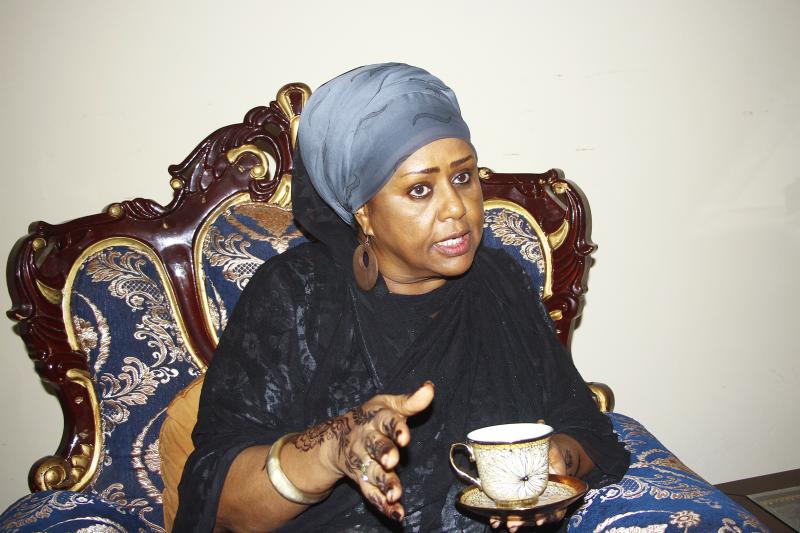
Photo: AP
Even as more educated women return to Somalia from the large diaspora to help rebuild the country after three decades of conflict, attitudes toward Adam’s run for office are mostly skeptical, if sympathetic. Even friends and colleagues see her chances as next to impossible because of her gender.
“She’s good, but unfortunately she’s a woman,” said Abdiwahid Mohamed Adam, a doctor at Mogadishu Memorial Hospital. Complicating her bid, he said, is the fact that Adam comes from the breakaway region of Somaliland, a comparatively stable area in the north that has sought international recognition as an independent country for years.
But the soft-spoken Adam, a widow and mother of three, said she believes her run for the presidency is worthwhile, not futile, on several levels, while the timing of the election has been pushed back once again amid political tensions from mid-October toward the end of the year.
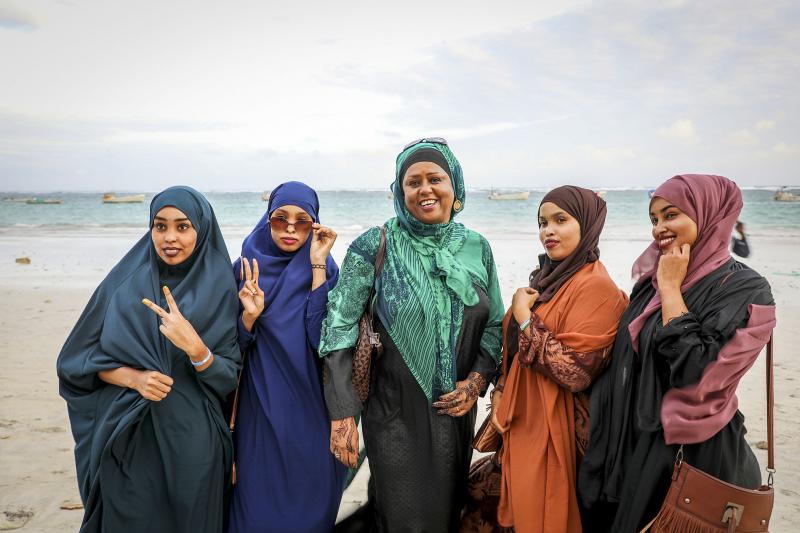
Photo: AP
“I want to break this barrier against women, so that in the near future many others will have the courage to run and even win,” she said, adding that it’s time to fight for the rights of women.
LOW-PROFILE CAMPAIGN
Somalia’s years of insecurity marked by devastating attacks by the al-Qaida-linked al-Shabab extremist group also have driven Adam to run. “There was mayhem in this country for the past 30 years,” she said. “Young people are dying like flies, killing each other, exploding themselves, killing other people.”
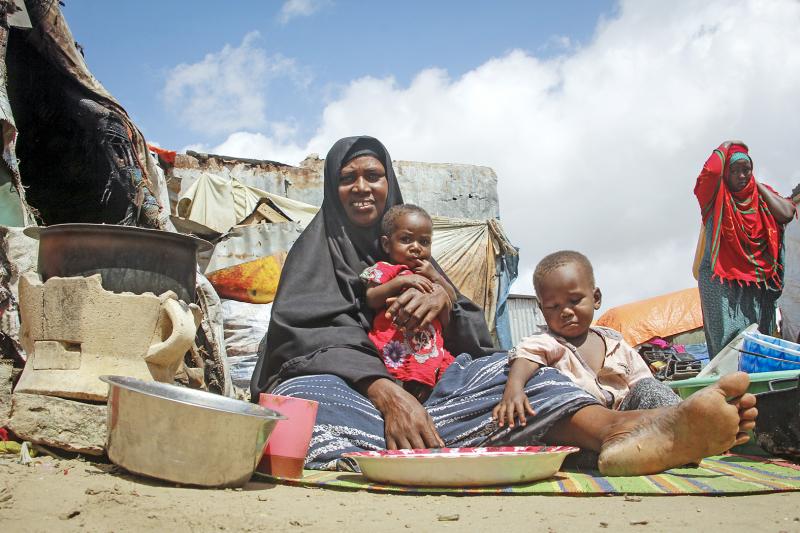
Photo: AP
Like others across Somalia, she has watched as the insecurity weakened the country’s foundation. High unemployment, poor education and one of the world’s least-equipped health systems are all a result. Corruption and political squabbling haven’t helped.
“I thought a woman may be what this country needs, the leadership of a woman, to bring peace and stability,” Adam said.
Her presidential campaign has been relatively low-profile because of the insecurity and the COVID-19 pandemic. Instead of holding large public rallies, Adam prefers smaller indoor gatherings.
“This could be less expensive but less effective as well,” said Liban Abdullahi Farah, a political analyst in the capital, Mogadishu.
Unlike many other candidates and everyday people in Somalia, where face masks are hardly seen despite having one of the highest COVID-19 case fatality rates in Africa, Adam says she takes the pandemic seriously and speaks bluntly about its dangers after seeing several friends die.
“I keep giving advice on this pandemic, particularly how badly it impacts women and the poorest of them,” she said. “We don’t have a good health system to deal with this phenomenon.”
WOMEN HIT HARD
Women in Somalia have been especially hard hit by the virus, Adam said, both physically and economically.
“I personally took my two vaccinations, many people did, but many poor people in the camps, the internally displaced people, the very poor, vulnerable people do not have that chance,” she said. “What I am hoping is to win this election. (The pandemic) will be one of my priorities, because we don’t want to lose more people.”
Apart from some awareness messaging, Somalia’s federal government does little to enforce basic virus prevention measures of social distancing, hand-washing and mask-wearing.
At the country’s coronavirus treatment center in the capital, deputy director Abdirahim Omar Amin said that “very many women have been infected” by COVID-19. Health ministry data, however, show that men represent more than 70 percent of confirmed cases in Somalia.
“The people themselves do not have the awareness, or they are in a state of denial, calling it `just heartburn’ and stay at home, and the person is brought here when it is too late,” he said.
Among the women Adam hopes to help if elected president is Fatuma Mohamed, one of the hundreds of thousands of people living in camps in Mogadishu after being displaced by insecurity or climate shocks like drought.
Mohamed said her husband died of COVID-19, while she survived. Now she struggles to raise two young children, earning money by doing laundry when she can.
“This disease has devastated us, it killed my mother and my husband,” she said. “I have not seen anyone offering me a helping hand. I struggle all alone.”
Adam’s path in life has been far different. Married to a general, she first entered politics in her hometown of Hargeisa in Somaliland years ago but fled to Mogadishu, saying local politicians saw her as a threat. She later started a political party, the National Democratic Party, and rose to some of the country’s highest offices.
Now, in pursuit of the presidency, Adam has Somaliland in mind as part of her ambitions.
“If I am elected, I am sure I could reunite my country as I belong to both sides, the north and south,” she said, “and I believe that I am the only person who’s capable of doing that as I already made a plan for the unification.”
If her candidacy fails, she said, she aims to become prime minister, adding “I would always advise whoever wins the presidency.”

Water management is one of the most powerful forces shaping modern Taiwan’s landscapes and politics. Many of Taiwan’s township and county boundaries are defined by watersheds. The current course of the mighty Jhuoshuei River (濁水溪) was largely established by Japanese embankment building during the 1918-1923 period. Taoyuan is dotted with ponds constructed by settlers from China during the Qing period. Countless local civic actions have been driven by opposition to water projects. Last week something like 2,600mm of rain fell on southern Taiwan in seven days, peaking at over 2,800mm in Duona (多納) in Kaohsiung’s Maolin District (茂林), according to
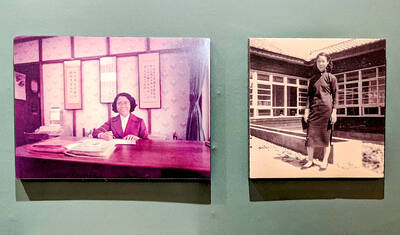
Aug. 11 to Aug. 17 Those who never heard of architect Hsiu Tse-lan (修澤蘭) must have seen her work — on the reverse of the NT$100 bill is the Yangmingshan Zhongshan Hall (陽明山中山樓). Then-president Chiang Kai-shek (蔣介石) reportedly hand-picked her for the job and gave her just 13 months to complete it in time for the centennial of Republic of China founder Sun Yat-sen’s birth on Nov. 12, 1966. Another landmark project is Garden City (花園新城) in New Taipei City’s Sindian District (新店) — Taiwan’s first mountainside planned community, which Hsiu initiated in 1968. She was involved in every stage, from selecting
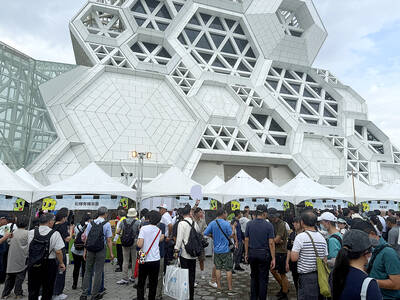
The latest edition of the Japan-Taiwan Fruit Festival took place in Kaohsiung on July 26 and 27. During the weekend, the dockside in front of the iconic Music Center was full of food stalls, and a stage welcomed performers. After the French-themed festival earlier in the summer, this is another example of Kaohsiung’s efforts to make the city more international. The event was originally initiated by the Japan-Taiwan Exchange Association in 2022. The goal was “to commemorate [the association’s] 50th anniversary and further strengthen the longstanding friendship between Japan and Taiwan,” says Kaohsiung Director-General of International Affairs Chang Yen-ching (張硯卿). “The first two editions
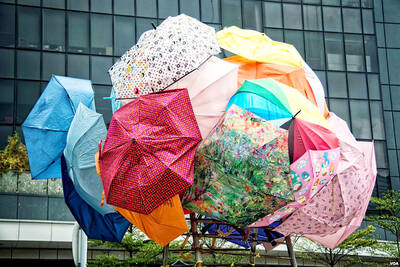
It was Christmas Eve 2024 and 19-year-old Chloe Cheung was lying in bed at home in Leeds when she found out the Chinese authorities had put a bounty on her head. As she scrolled through Instagram looking at festive songs, a stream of messages from old school friends started coming into her phone. Look at the news, they told her. Media outlets across east Asia were reporting that Cheung, who had just finished her A-levels, had been declared a threat to national security by officials in Hong Kong. There was an offer of HK$1m (NT$3.81 million) to anyone who could assist